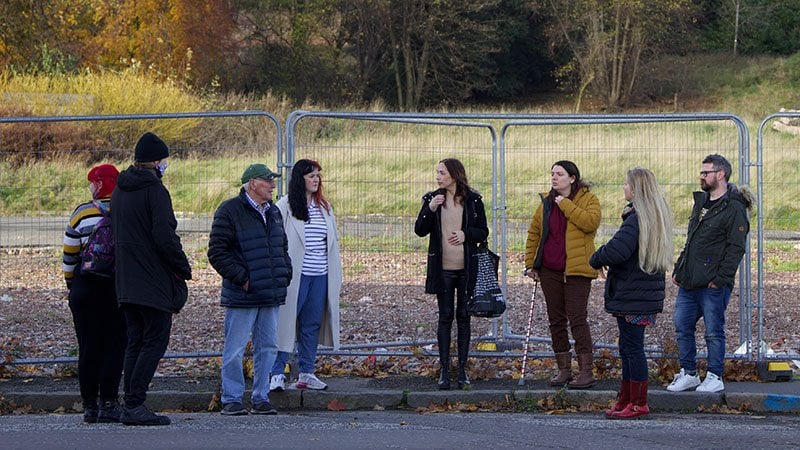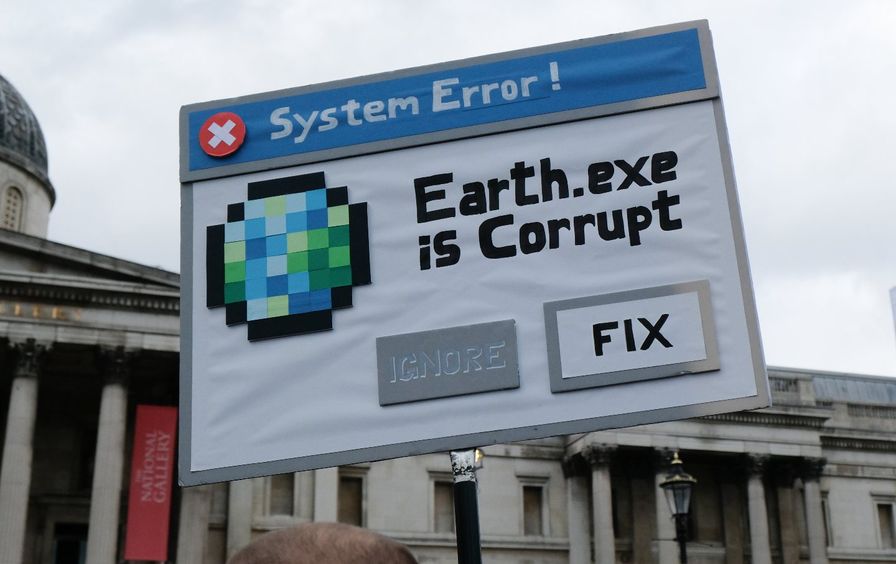On Tuesday morning, a couple dozen residents of Alloa, Scotland, wandered through the ruins of two buildings on the outskirts of town. The 150-year-old structures had their windows boarded and metal fencing lined the road to prevent vandals from breaking in. All around were rubble-strewn fields where once a sprawling whiskey distillery had stood.
The group was sizing up the property as a potential new home for Resonate Together, a local non-profit dedicated to helping local people recover from trauma—including the COVID-19 pandemic—and begin to live more hopeful lives. The buildings and the wasteland around them were symbolic of the fate of Alloa itself. Once a thriving industrial center, it’s now a symbol of decline.


As global policymakers wrap up the UN’s COP26 climate conference in Glasgow, Scotland, a small town just a few miles away illustrates the challenges we face in making society more resilient as well as a potential path to do so.
Alloa, with 20,000 residents, was once a thriving center for innovation in shipping, wool weaving, and glass making. Now, most of its industries have shut down, old buildings are shuttered and jobs are scarce. The town is racked by poverty, drug and alcohol abuse, and hopelessness. Yet a social enterprise named Resonate Together has gradually gained ground there, with arts and crafts programs designed to help individuals recover from trauma and rebuild community together.
“Resonate Together is a whole-system approach that’s led by the community,” says Angela Watt, a sculptor and former Cobol programmer who established the organization a decade ago. “We start with the principle that people want to be approached as human beings and not with their typical labels.” The goals, she says, are to improve employability, address inequality, and improve mental health.

Resonate Together’s programs tend to be more freeform than is typical in social services. People come together there, drawn by the opportunity to work on an art project or learn a new skill. They get out of the house, talk to one another, compare notes on life, and create art. In the process, they strengthen the community.
The newest program, called Potentia Collective, is intended to help individuals and the community recover from the COVID-19 crisis. Each week, the group addresses a different aspect of recovery. A few weeks ago, they wove sculptures using ivy gathered in a local park—which took them out into nature. Alloa resident Mary Banks says the experience has helped her deal with depression and gain confidence to resume university studies. “This is about sharing positivity,” she says. “We can start something that makes us proud of our community and maybe it can be done in other small communities that are struggling.”
The UN has set a goal for the world to reach net-zero carbon emissions by 2050 to avoid climate-change calamity, but it also recognizes that potentially devastating changes are surely coming and we need to make communities more resilient to deal with them.
In the United States, national, state, and local governments have spent untold billions of dollars on programs aimed at revitalizing towns and small cities left behind as industries faded away. In most places, all that investment has not reversed the tide of economic decline. The money does little more than hospice communities as they slowly die. But the Resonate Together experiment in Alloa, which depends on volunteerism and small dollops of government and grant funding, shows that grassroots efforts at regeneration can give people hope, unleash creativity, and, perhaps, lead to economic revitalization. Not every town can be reborn as a mini Silicon Valley, but, by healing individuals and reviving hope, communities can lay the groundwork for discovering new purpose.
Recovery is a first step, and that’s what Angela Watt was focused on when she launched Resonate Together. She had moved to Clackmannanshire, where Alloa is located, because she had taken a job that required her to live in central Scotland. Over time, she came to understand the complex forces that mire a place in poverty, and she wanted to do something about it. She had trained in university as a sculptor, and, when the opportunity arose, she led the arts component of a government-funded project aimed at helping revitalize the downtown. Afterwards, she proposed to the town council that they fund an ongoing arts program, but was turned down. Then, with financial help from her mother, she went ahead and launched Resonate Together anyway.

When she first approached local residents about the program, they reacted negatively. People said they were tired of being drawn into programs where outsiders came in, got them excited, and then left when funding ran out. So Watt saw that for her project to succeed, it had to be run on a shoestring budget, and designed by and for local people. Around that time she attended a workshop on quantum physics. She learned about systems theory, and how we can find patterns in nature even within apparent chaos. Applying this thinking to local communities, she saw that as long as individuals are isolated from one another, they would likely struggle. By bringing people together to share their stories and learn—to create resonance—both individuals and communities could recover, she thought.
From the start, Watt and her group of volunteers had environmental sustainability and community resilience in their minds. A number of the crafts programs involved restoring furniture, reusing clothing, and fixing broken tools and devices. “We encouraged people not to horde. We’ll recycle or upcycle,” she says. “We had workshops. We taught people how to repair things and build things.”
In addition, in the fine arts programs they encouraged people to sell their creations—and staged exhibitions to help them do so. It built confidence and participants made a little money.
One of Watt’s volunteers, Jamie Coe-Welch, first became involved in Resonate Together six years ago. At the time he was depressed and suicidal. Participating in the arts programs brought him back from the brink. He specializes in pyrography—creating illustrations by burning lines in wood. “Doing art made me feel better. You can do wonderful things,” he says. Now, Coe-Welch volunteers as a peer counselor helping other people deal with mental health issues.
Watt says it’s hard to measure the impact of Resonate Together, since so much of it is aimed at boosting individuals’ attitudes and confidence rather than delivering more concrete results, such as degrees and jobs. Still, it’s clear that the programs have improved participants’ mental states. For instance, one survey showed that 36 participants actually said they had avoided suicide because the programs gave them hope.
As the impacts of climate change spread and intensify across the globe, even the healthiest communities will be challenged to respond—and the weakest will be sorely tested. Economic shifts already underway will likely be accelerated. Regenerative programs such as Resonate Together aren’t generally seen as related, but they need to become key elements in society’s response to climate change. New technologies may help blunt the sharpest blows, but fostering hope and strengthening community is just as essential.
—
Steve Hamm is a freelance writer and documentary filmmaker based in New Haven, CT, USA. His new book, The Pivot: Addressing Global Problems Through Local Action, was published by Columbia University Press in October. This is the last in a series of dispatches connected to the COP26 climate conference in Glasgow.
Read more from Steve Hamm’s COP26 Dispatches
October 29th: COP26: Let’s Pivot to Save the Planet
November 1: SustainChain: a Collaboration Platform for Do-Gooders
November 3: How Oil-Rich Aberdeen is Pivoting Away from Fossil Fuels
November 5: Glasgow Dispatch: Startup Funding Encourages Sustainability
November 8: Can Better Town-Gown Relations Help Save the Planet?
November 8: Young People Are Watching, and They’re Pissed Off
November 9: Piloting Big Technologies On a Tiny Scottish Island
















